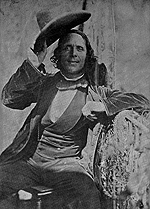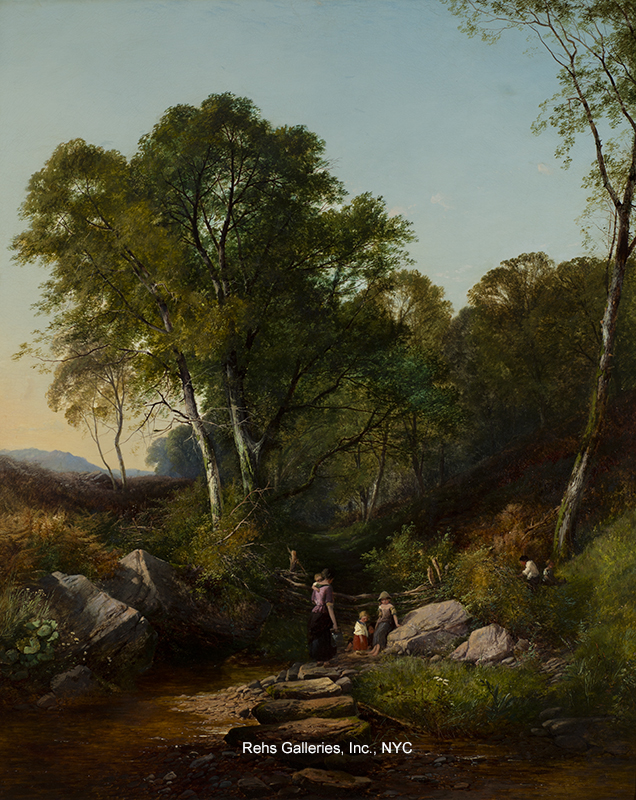Henry John Boddington
(1811 - 1865)
The Edge of the Lake - Evening
Oil on canvas
44 x 36 inches
Signed and dated 1859
BIOGRAPHY - Henry John Boddington (1811 - 1865)

Born Henry John Williams, he was the second of six sons of Edward Williams, all of whom were artists. Boddington showed an early talent for painting and received his only formal training from his father. He quickly developed an individual style ? characterized by his manipulation of blocked light as it filtered through an archway of trees. Jan Reynolds, in her book The Williams Family of Painters, notes that one of Boddington's:
...most characteristic effect is the appearance of a warm day, with the sun just out of the picture, giving a filmy, hazy atmosphere to the landscape, with deep blue shadows adding greater value to the opposing tone of yellow. The distant mountains are melting in vapory sunlight. The artist is a master of this effect...
Boddington enjoyed working on a large-scale ? allowing him to capture the majestic beauty of the English countryside. The Fine Arts Quarterly Review (Vol.3, 1865) noted that Boddington was:
...an artist who, if he fell into mannerism, had yet during a hard working life, painted pictures not only large, but sometimes grand. His landscapes of mountains, lake and river had scenic breadth and power...
It was these aspects of his work that made him so popular during his lifetime.
In 1832, he married Clarissa Eliza Boddington and decided to adopt her maiden name ? thereby giving him and his paintings more individual identification. By 1840, he already established his reputation as a painter of woodland and village scenes and in 1842, at the age of 31, he became a member of the Royal Society of British Artists. Although a great number of artists exhibited with the Society, membership was very limited and H.J. Boddington was the only member of his family to achieve this honor which carried with it definite status and responsibility.
It is interesting to note that Boddington, at times, collaborated with the sporting artist John Frederick Herring, Sr., a fellow Member of the Royal Society of British Artists. Herring contributed by painting horses and animals into a Boddington's prepared landscape.
Boddington exhibited extensively throughout his lifetime ? showing works at the Royal Academy (RA), Royal Society of British Artists (RBA), The British Institution and elsewhere. Among the works he exhibited were: On the Thames near Weybridge (RA, 1837); The Gyspy Camp (RA, 1843); A Quiet Morning – North Wales (RA, 1851); The Lake of Tal-y-llyn, North Wales (RBA, 1853); Tintern Abbey – Evening (RBA, 1859).
Today examples of Boddington's work can be seen in the Victoria & Albert Museum, London; National Museum of Wales, Cardiff; City Art Gallery, Blackburn; Art Gallery and Museum, Glasgow; Harris Museum and Art Gallery, Preston; City Art Gallery, York; Graves Art Gallery, Sheffield and Museum of Fine Arts, Boston, Mass.

